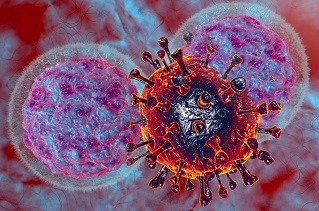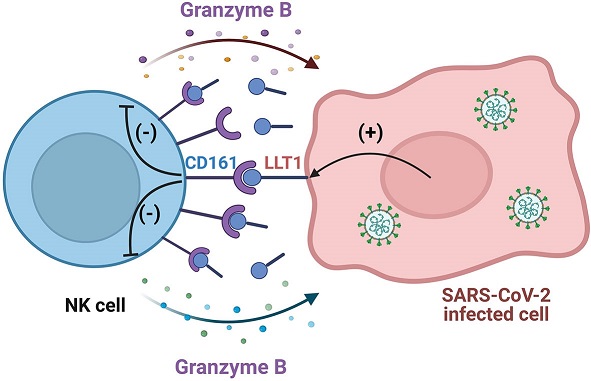Polish Study Reveals That SARS-CoV-2 Impairs Human Natural Killer (NK) Cells Through The Activation Of The LLT1-CD161 Axis
COVID-19 News - SARS-CoV-2 Impairs NK Cells Jun 11, 2023 1 year, 10 months, 1 week, 1 day, 22 hours, 56 minutes ago
Many ‘Post-COVID’ Individuals Will Ultimately Be Susceptible To Higher Risk Of Secondary Opportunistic Viral Infections And Cancer!
COVID-19 News: Researchers from Jagiellonian University and the University Hospital in Krakow, Poland have in a new study uncovered a previously unknown mechanism by which SARS-CoV-2, the virus responsible for COVID-19, impairs the crucial functions of natural killer (NK) cells.
 Image Credit-Numstocker/Shutterstock
Image Credit-Numstocker/Shutterstock
NK cells are a vital part of the immune system, responsible for controlling viral infections. Natural killer cells (NK cells) are white blood cells that destroy infected and diseased cells, like cancer cells. They're also a type of lymphocyte, like B-cells and T-cells. NK cells can destroy harmful cells in the early stages, preventing viruses and cancer cells from spreading.
Past
COVID-19 News reports already showed that the SARS-CoV-2 virus is able to evade and also impair the human host NK cells and its functions.
https://www.thailandmedical.news/news/covid-19-news-study-finds-that-sars-cov-2-impairs-natural-killer-nk-cells-functions
https://www.thailandmedical.news/news/covid-19-news-stanford-study-discovers-sars-cov-2-evades-immune-system-s-nk-cells-via-nsp1-induced-downregulation-of-receptor-nkg2d-ligands
https://www.thailandmedical.news/news/stanford-study-shows-that-the-sars-cov-2-coronavirus-is-able-to-evade-cytotoxic-responses-of-natural-killer-cells-and-cause-immune-dysfunction
https://www.thailandmedical.news/news/activation-of-type-1-dendritic-cells-cd11c-cd141-clec9a-and-exhausted-natural-killer-cells-are-key-drivers-of-post-covid-multisystem-inflammatory-synd
https://www.thailandmedical.news/news/austrian-study-discovers-that-genetic-variants-of-the-host-cd16a-antibody-receptor-are-associated-with-the-risk-of-severe-covid-19
However, the immune dysregulation observed in COVID-19 patients has been linked to a decline in both the number and function of NK cells. Until now, the ex
act mechanism behind this inhibition of NK cell functions and the complex interplay between infected cells and NK cells remained largely unknown.
The team of researchers conducted a series of experiments to investigate the impact of SARS-CoV-2 infection on NK cells. They co-cultured NK cells with SARS-CoV-2 infected airway epithelial cells and analyzed the expression of various important receptors on the surface of NK cells. The study team observed a significant downregulation of CD161, a receptor known as NKR-P1A or KLRB1, on NK cells, which was accompanied by impaired NK cell cytotoxicity against infected cells.
Furthermore, the researchers discovered that SARS-CoV-2 infection led to an upregulation of the ligand for CD161, called lectin-like transcript 1 (LLT1), on infected epithelial cells. They found that LLT1 protein was not only present in the supernatants of infected cells but also detectable in the serum of COVID-19 patients. Strikingly, treatment of NK cells with soluble LLT1 protein resulted in a significant reduction in CD161-expressing NK cells, diminished ability to control SARS-CoV-2 infection, and decreased production of granzyme B, a protein crucial for NK cell cytotoxicity.
These study findings suggest that SARS-CoV-2 utilizes the LLT1-CD161 axis to impair the functions of NK cells, potentially enabling the virus to evade immune responses. By shedding light on this novel mechanism, the researchers have provided a deeper understanding of the complex interactions between the SARS-CoV-2 virus and the immune system, which may inform the development of new strategies to combat COVID-19.
 Scheme of SARS-CoV-2 mediated NK cell impairment by the activation of the LLT1-CD161 axis. LLT1 expression is upregulated in SARS-CoV-2 infected epithelial cells. LLT1 acts as a ligand for the NK cell CD161 receptor, which, in turn, inhibits granzyme B production by NK cells, inhibiting NK cell-mediated antiviral functions, their cytotoxicity capacity, yet not the degranulation level.
Scheme of SARS-CoV-2 mediated NK cell impairment by the activation of the LLT1-CD161 axis. LLT1 expression is upregulated in SARS-CoV-2 infected epithelial cells. LLT1 acts as a ligand for the NK cell CD161 receptor, which, in turn, inhibits granzyme B production by NK cells, inhibiting NK cell-mediated antiviral functions, their cytotoxicity capacity, yet not the degranulation level.
The impact of this discovery cannot be overstated. With COVID-19 having claimed millions of lives worldwide, understanding how the virus evades immune responses is of utmost importance. The identification of the LLT1-CD161 axis as a critical pathway in NK cell impairment opens up new avenues for therapeutic interventions. Future research may focus on targeting this axis to enhance NK cell functions and restore the immune system's ability to effectively combat SARS-CoV-2.
While more studies are needed to fully comprehend the implications of this research, the findings offer a glimmer of hope in the fight against COVID-19. With the knowledge gained from this study, scientists and medical professionals can now explore innovative treatment strategies that specifically target the LLT1-CD161 axis, potentially bolstering the immune response against SARS-CoV-2 and improving patient outcomes.
The study findings were published in the peer reviewed journal: Frontiers in Immunology.
https://www.frontiersin.org/articles/10.3389/fimmu.2023.1123155/full
For the latest
COVID-19 News, keep on logging to Thailand Medical News
Read Also:
https://www.thailandmedical.news/news/unconventional-t-cells-known-as-mucosal-associated-invariant-t-mait-and-invariant-natural-killer-t-inkt-cells-that-play-a-role-in-covid-19-severity
https://www.thailandmedical.news/news/covid-19-immunology-swedish-study-shows-natural-killer-cell-immunotypes-linked-to-covid-19-disease-severity
Explore using Ashwagandha, Resveratrol from Japanese knotweed and Cat's Claw to repair impaired NK cells and boost NK cell levels in the COVID-19 context. Lots of data can be extracted from published studies.

